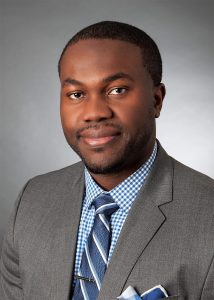Is Being Black a Problem at Law Firms?
Black lawyers must constantly prove that they are educated enough, that they earned their bar licenses, and that they belong.
March 14, 2019 at 10:48 AM
6 minute read

The legal community is bogged down with the constant problem of how to resolve the issue of diversity—or the lack thereof—in law firms. But is diversity and inclusion truly a goal, or is it a topic that allows law firms to pay lip service to the notion while still maintaining the status quo?
 Henry E. Ibe
Henry E. IbeTouting a commitment to diversity has become an increasingly popular practice for law firms. However, what we see in reality is tokenism, wherein firms symbolically recruit a small number of people from underrepresented groups to give the appearance of a diverse workforce. It is a shame that firms still try to sell the image of diversity by consciously selecting a few minority associates and partners to be placed on firm brochures. These firms often fail to genuinely foster an environment that encourages, supports and cherishes the exchange of diverse ideas, and the equal treatment of attorneys.
Some in the legal community have opined that to remedy the problem with diversity, the decision must be made at the top. This is true in part, as a firm's management would have to be receptive to the idea of diversity, but being receptive and actually buying into the idea are two different things. There are those who simply want diverse candidates because, like icing on a cake, the optics are appealing to an outside audience, even if devoid of any substance.
On the other hand, some attorneys understand that their community comprises people from different backgrounds, races, cultures and geographies. They appreciate that to adequately serve their clients and provide a wealth of different perspectives, the firm must be able to create a workforce that thinks like and is representative of the clientele it serves. Accomplishing such a diverse workforce is truly difficult, because true diversity would require acceptance of people who are different from the status quo. I dare say it would force management to confront the biases and underlying prejudices that exist within firms.
The National Association for Law Placement released its 2018 report on diversity in law firms, showing that despite small increases in the past three years, representation of black associates remains just below the pre-recession level of 4.66 percent (now at 4.48 percent). Minority women continue to be the most dramatically underrepresented group at the partnership level, and representation of black partners has barely increased since the recession, with the number currently at 1.83 percent.
These figures lead to some relevant questions: How are black associates being perceived and treated at firms? Have firms' management and employees alike been trained to check their implicit biases toward minority attorneys? Are minority attorneys paired with mentors who are willing to invest in their growth as attorneys? Is there a clear path toward partnership or management? Are they treated as valued members of the firm? Are they afforded the same treatment as the majority attorneys within the firm? Are their actions judged in the same way? Is the firm taking proactive measures to hold itself accountable to these ideals?
The aforementioned questions are building blocks that firms should first consider in trying to implement a diverse and inclusive culture. Unfortunately, firms are not immune to the social ills and prejudices that exist in society. Consciously or unconsciously, these prejudices play out within their walls. Some in management would rather believe that these issues are nonexistent and would give the majority within their firms the benefit of the doubt. However, the same benefit is not afforded to black attorneys. They constantly must prove that they are educated enough, that they earned their bar licenses, and that they belong. I contend that no other group within the legal profession is prejudged more based on race, despite their effort, hard work, character, accomplishments and accolades. Justifiably, I am led to ask whether a huge part of the problem with diversity in the legal community is being black. Furthermore, do most law firms truly want black attorneys as part of their firms at all, and do they genuinely encourage their success?
Indeed, diversity is good for business. Nonetheless, it cannot be achieved if the people who are supposed to champion the cause—those directly affected—are put down by prevailing stereotypes and actions that run counterintuitive to that end. We need to stay aware and try to create a conducive environment for diversity and inclusion to thrive. If the minority attorneys or, specifically, the black attorneys within a firm are happy, valued and satisfied with their positions, they will speak positively about diversity and be roused to serve as mentors and champions in recruitment activities.
There has been a sentiment expressed that the lack of diversity can also be attributed to fewer diverse candidates applying for associate job openings. This is somewhat true, as the number of racially diverse candidates, specifically black candidates, in law schools has dwindled. But it is no coincidence that the firms that use this as their main excuse are the least-diverse firms. Instead of shifting blame to the candidate pool, firms should re-examine their hiring practices; culture/structure; retention and promotion of their diverse associates/partners; and credit distributions/bonuses. The legal community is a small one. Over time we get to know people in each other's circles. Black attorneys make up an even smaller subset of the legal community. Not surprisingly, they share their plights and frustrations, especially if firms are not treating them well or fostering their growth and development. When it comes to diversity in the law, appearances matter, but the mistake made by firms is thinking that representation equals satisfaction.
Change does not come easy. The struggle toward achieving the goal of diversity and inclusion in the legal community is a process, but one that we all must be invested in. Certainly, this is not a plea for special treatment but for fair and equal treatment of minority attorneys in law firms and the legal community in general. This piece is not intended to ascribe blame; rather, the purpose is to express the frustration that is shared by many minority attorneys. It is intended to force us to not only talk, but act, regarding the elephant in the room. How are black attorneys being treated at our firms? How are minority attorneys being treated at our firms? We can entertain this unpopular viewpoint or ignore it as the angry rambling of a disgruntled black attorney. The choice is ours.
Henry E. Ibe is the founder and principal of H.I. Legal in Southfield, Michigan.
This content has been archived. It is available through our partners, LexisNexis® and Bloomberg Law.
To view this content, please continue to their sites.
Not a Lexis Subscriber?
Subscribe Now
Not a Bloomberg Law Subscriber?
Subscribe Now
NOT FOR REPRINT
© 2025 ALM Global, LLC, All Rights Reserved. Request academic re-use from www.copyright.com. All other uses, submit a request to [email protected]. For more information visit Asset & Logo Licensing.
You Might Like
View All
Government Attorneys Face Reassignment, Rescinded Job Offers in First Days of Trump Administration
4 minute read


Energy Lawyers Field Client Questions as Trump Issues Executive Orders on Industry Funding, Oversight
6 minute readTrending Stories
- 1We the People?
- 2New York-Based Skadden Team Joins White & Case Group in Mexico City for Citigroup Demerger
- 3No Two Wildfires Alike: Lawyers Take Different Legal Strategies in California
- 4Poop-Themed Dog Toy OK as Parody, but Still Tarnished Jack Daniel’s Brand, Court Says
- 5Meet the New President of NY's Association of Trial Court Jurists
Who Got The Work
J. Brugh Lower of Gibbons has entered an appearance for industrial equipment supplier Devco Corporation in a pending trademark infringement lawsuit. The suit, accusing the defendant of selling knock-off Graco products, was filed Dec. 18 in New Jersey District Court by Rivkin Radler on behalf of Graco Inc. and Graco Minnesota. The case, assigned to U.S. District Judge Zahid N. Quraishi, is 3:24-cv-11294, Graco Inc. et al v. Devco Corporation.
Who Got The Work
Rebecca Maller-Stein and Kent A. Yalowitz of Arnold & Porter Kaye Scholer have entered their appearances for Hanaco Venture Capital and its executives, Lior Prosor and David Frankel, in a pending securities lawsuit. The action, filed on Dec. 24 in New York Southern District Court by Zell, Aron & Co. on behalf of Goldeneye Advisors, accuses the defendants of negligently and fraudulently managing the plaintiff's $1 million investment. The case, assigned to U.S. District Judge Vernon S. Broderick, is 1:24-cv-09918, Goldeneye Advisors, LLC v. Hanaco Venture Capital, Ltd. et al.
Who Got The Work
Attorneys from A&O Shearman has stepped in as defense counsel for Toronto-Dominion Bank and other defendants in a pending securities class action. The suit, filed Dec. 11 in New York Southern District Court by Bleichmar Fonti & Auld, accuses the defendants of concealing the bank's 'pervasive' deficiencies in regards to its compliance with the Bank Secrecy Act and the quality of its anti-money laundering controls. The case, assigned to U.S. District Judge Arun Subramanian, is 1:24-cv-09445, Gonzalez v. The Toronto-Dominion Bank et al.
Who Got The Work
Crown Castle International, a Pennsylvania company providing shared communications infrastructure, has turned to Luke D. Wolf of Gordon Rees Scully Mansukhani to fend off a pending breach-of-contract lawsuit. The court action, filed Nov. 25 in Michigan Eastern District Court by Hooper Hathaway PC on behalf of The Town Residences LLC, accuses Crown Castle of failing to transfer approximately $30,000 in utility payments from T-Mobile in breach of a roof-top lease and assignment agreement. The case, assigned to U.S. District Judge Susan K. Declercq, is 2:24-cv-13131, The Town Residences LLC v. T-Mobile US, Inc. et al.
Who Got The Work
Wilfred P. Coronato and Daniel M. Schwartz of McCarter & English have stepped in as defense counsel to Electrolux Home Products Inc. in a pending product liability lawsuit. The court action, filed Nov. 26 in New York Eastern District Court by Poulos Lopiccolo PC and Nagel Rice LLP on behalf of David Stern, alleges that the defendant's refrigerators’ drawers and shelving repeatedly break and fall apart within months after purchase. The case, assigned to U.S. District Judge Joan M. Azrack, is 2:24-cv-08204, Stern v. Electrolux Home Products, Inc.
Featured Firms
Law Offices of Gary Martin Hays & Associates, P.C.
(470) 294-1674
Law Offices of Mark E. Salomone
(857) 444-6468
Smith & Hassler
(713) 739-1250










